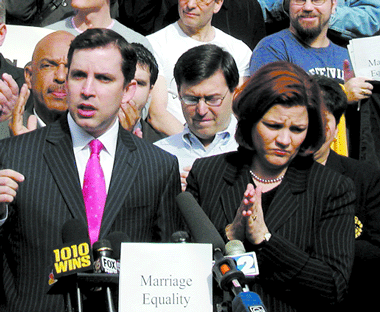Councilwoman Christine Quinn stakes her claim on speaker’s perch
Councilwoman Christine Quinn of Manhattan wants to succeed fellow Democrat Gifford Miller, a mayoral contender, as the next speaker of the New York City Council.
In a speech this week as part of the LGBT Community Center’s popular Second Tuesday series, Quinn made clear that whoever wins the mayor’s race in November—the incumbent Republican Michael Bloomberg, Democrat Miller, who is her candidate, or one of the other Democrats, Manhattan Borough Pres. C. Virginia Fields, former Bronx Borough Pres. Fernando Ferrer or Brooklyn Congressman Anthony Weiner—the next resident of Gracie Mansion will have to contend with a lesbian elected official who is nothing if not proactive on behalf of the rights of the city’s lesbian, gay, bisexual and transgender community.
Quinn used her time Tuesday evening first and foremost to blast Bloomberg for his court challenge to the Equal Benefits Law that she sponsored that requires contractors doing business with the city to give the same benefits to domestic partners as those offered to spouses. The law passed on a Council override of a Bloomberg’s veto and a recent appellate court ruling deemed the measure unconstitutional. If that decision is upheld by the Court of Appeals, the state’s highest court, Bloomberg’s effort “will do tremendous damage not just to domestic partners, but it will allow contractors to go into court and challenge other requirements and have them declared illegal,” said Quinn.
Quinn has represented her Chelsea and Greenwich Village constituents since 1999 when she succeeded Tom Duane, now a state senator, whom she served as chief of staff before heading the New York City Gay and Lesbian Anti-Violence Project.
Three of her Council colleagues from Queens, another three from Brooklyn and two from the Bronx have also declared their intention to succeed Miller, so the contest next January promises to be spirited. As the only declared candidate from Manhattan, Quinn may enjoy advantages, since councilmembers tend to vote for their home borough’s candidate.
“Hopefully, I’ll get to come back as speaker,” said Quinn.
In Council races for five open seats in Manhattan, Quinn is supporting the Lower East Side’s Rosie Mendez who is running to replace her boss Margarita Lopez; Jessica Lappin, Miller’s chief of district staff, for his seat; and Dan Gorodnick, president of the Tilden Democratic Club, for the one held by Eva Moskowitz. Both Lopez and Moskowitz, as well as Councilman Bill Perkins are in the hunt for Manhattan borough president.
Quinn said she is waiting to see how events develop in two uptown races for the seats now held by Perkins and Phil Reed before making endorsements.
Quinn touted several new gay initiatives that Miller introduced into the Council on Wednesday to expand domestic partner rights. One would equalize the standard of proof required of domestic partners and married couples in accessing city services. Couples registered under the city’s domestic partner program are now sometimes asked for two additional pieces of identification proving they are a couple, in addition to their registration certificate, whereas married couples need only show a marriage license. The measure is one more step in the process of strengthening a 1998 domestic partners law that former Mayor Rudy Giuliani said would give domestic partners the same rights as spouses, but did not.
The Council will also consider home rule messages to Albany calling on the state Legislature to pass a bill introduced by Duane and Manhattan Assemblyman Danny O’Donnell, the Legislature’s two gay male members, to let the domestic partner of a police officer killed in the line of duty receive the same death benefit as a spouse. Quinn and Miller are also asking the Council to call on the Legislature to give New Yorkers with domestic partners a tax credit for the cost of partner benefits, now counted as income.
“If Albany denies us, it will be the first time it has denied a tax credit requested by a municipality,” she said.
Asked if the city itself could pay the police death benefit if Albany refuses, Quinn said that the idea of creating such a fund was “interesting.”
As chair of the Council’s health committee, Quinn is scheduling a joint hearing with Lopez, who chairs the mental health committee, on placing greater restrictions on the sale of products used to make crystal meth, a drug that has been associated with many recent HIV infections among gay men.
Later this spring, Quinn wants to join with Moskowitz and hold a hearing on the lack of HIV/AIDS education in the schools. Such lessons are mandated, but have not been conducted in most schools for years now.
This Monday, Moskowitz’s education committee will hold an oversight hearing on implementation of the Dignity in All Schools Act. The Department of Education has only reported a “small number” of bias-related incidents in the schools because they are only counting those classified by the police department’s Hate Crimes Task Force, and Moskowitz believes that the city has done little to implement the new law, also passed over mayoral veto last year.
“We don’t want it to get to the level of arrest before the schools count them,” Quinn said.
Quinn is hopeful Bloomberg will be defeated in November.
“He’s in an odd political corner,” she said. “He was a Democrat who became a Republican to become mayor, but most Republicans don’t buy him as a Republican. He’s tried to buy them by giving unbelievable amounts of money to the party.”
Perhaps also referring to Bloomberg’s decision to appeal a Manhattan Supreme Court ruling in favor of same-sex marriage, Quinn added, “Our community is the one he has chosen to throw overboard in making his case to Republicans.”
gaycitynews.com


































